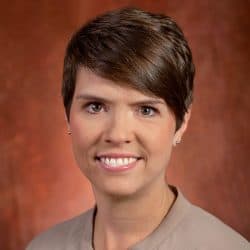School of Communication Science and Disorders (SCSD) Assistant Professor Dr. Andrea Barton-Hulsey recently received a grant from the Council on Research & Creativity (CRC) for her research project titled “Creating a Developmental Disabilities Research Registry and Repository.” This project specifically focuses on aspects of communication development in individuals with developmental disabilities. Dr. Mollie Romano and Dr. Michelle Therrien, also in SCSD have supported the development of this project.

“An estimated 15% of children in the United States, have one or more neurodevelopmental disabilities,” Dr. Barton-Hulsey says. “Children with neurodevelopmental disabilities are a heterogeneous group who may have specific diagnoses such as Down syndrome or Fragile X syndrome, or diagnoses specific to environmental (e.g., fetal alcohol spectrum disorder) or unknown factors (e.g., idiopathic autism spectrum disorder, intellectual disability, motor disorders).”

Children with neurodevelopmental disabilities can experience difficulties with speech, language, literacy, and social communication. According to Dr. Barton-Hulsey, there is “limited research that documents the developmental trajectories of language, literacy, and social communication in children with neurodevelopmental disabilities, particularly for those with the most limited speech ability.” This research project has a focus on children with limited speech (children who use less than 20 spoken words), and the use of standardized, experimental and observational measures that do not require speech ability to understanding skills important for reading development.
“This work will provide an option for local families to register to receive information about research projects that are relevant to their child, as well as opt to participate in a longitudinal repository study of language, literacy, and social communication skills,” Dr. Barton-Hulsey says.
Through this project, the research team will gain a better understanding of the developmental trajectories of language, literacy, and social communication in children with neurodevelopmental disabilities.

“Children with limited speech ability have historically not had equitable access to intervention services, including instruction in reading,” Dr. Barton-Hulsey says. “Identifying links between these changes and children’s home and school educational experiences is needed in order to inform theoretical models of these relationships, and develop interventions that ensure equitable access to instruction for all children.”

